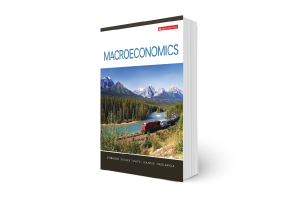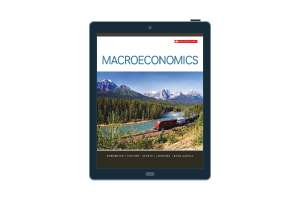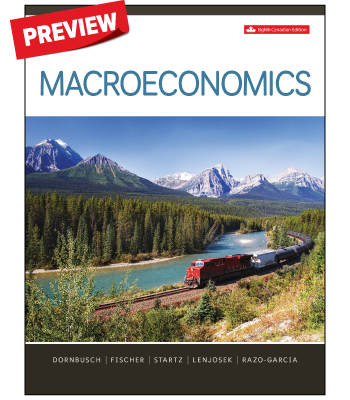Rudiger Dornbusch | Stanley Fischer | Richard Startz | Gordon Lenjosek | Raul Razo-Garcia
Coming July 2021
Overview
Macroeconomics deals with the major economic issues and problems of the day. To understand these issues, we must reduce the complicated details of the economy to manageable essentials. Those essentials lie in the interactions among the goods, labour, and assets markets of the economy, in the interactions among national economies that trade with each other, and in how fiscal and monetary policies affect outcomes.
In Macroeconomics, we have updated and reorganized a title that has been used by students of undergraduate macroeconomics for over 30 years, and in countries around the world. The authors explore state-of-the art research, while allowing for flexibility in how much to emphasize these topics. A balanced approach explains both the potential and limitations of economic policy. Our goal is to produce students who have the capacity to analyze current economic issues in the context of an economic frame of reference, namely, a set of macroeconomic models.
Table of Contents
Chapter 1: Introduction
Chapter 2: National Accounting
Chapter 3: Growth and Accumulation
Chapter 4: Growth and Policy
Chapter 5: Aggregate Supply and Aggregate Demand
Chapter 6: Aggregate Supply and Phillips Curve
Chapter 7: Unemployment
Chapter 8: Cost and Benefit of Inflation
Chapter 9: Monetary Policy: A Preview
Chapter 10: Income and Spending
Chapter 11: Money, Interest, and Income: The IS-LM Model and the Aggregate Demand Curve
Chapter 12: Monetary and Fiscal Policy
Chapter 13: International Linkages
Chapter 14: Consumption and Saving
Chapter 15: Investment Spending
Chapter 16: The Demand for Money
Chapter 17: The Bank of Canada, Interest Rates, and Money
Chapter 18: Policy
Chapter 19: Financial Markets and Asset Prices
Chapter 20: The National Debt
Chapter 21: Recession and Depression
Chapter 22: Inflation and Hyperinflation
Chapter 23: International Adjustment and Interdependence
Chapter 24: Advanced Topics
What's Inside
A Message from Our Author
Over the last several decades, editions of Macroeconomics have been written for many countries. While the laws and institutions of economics are universal, the institutions and economic situations of countries are country specific. For example, Canadian-U.S. trade is important to both countries, but bilateral trade is a much larger fraction of Canadian GDP than of U.S. GDP. As another example, the U.S. government almost always runs a large budget deficit while Canada’s federal budget is more balanced. Over time, Macroeconomics has taken on a world-wide flair. The late Rudi Dornbusch grew up in Germany; Stan Fischer grew up in what is now Zambia; and I grew up outside New York City. So we take great delight in this new Canadian edition which combines Canadian content and Canadian views with the universal laws of macroeconomics.
- Dick Startz, University of California, Santa Barbara
Purchase Options


Connect


Connect + Print Text




eBook
Coming July 2021
About the Canadian Author Team
Gordon Lenjosek
Gordon Lenjosek lectures at the University of Ottawa. He worked for 30 years with the Canadian federal government in Natural Resources Canada, the Department of Finance, Global Affairs, and Employment and Social Development Canada. While with the federal public service, he received a number of departmental awards of excellence for his work and has published on a range of topics relating to energy, the environment, taxation, and the retirement income system. He received an Honours B.A. in economics from McMaster University, and an M.A. and a Ph.D. in economics from the University of Western Ontario.
Raúl Razo-Garcia
Raúl Razo-Garcia is an Associate Professor in the Department of Economics at Carleton University in Ottawa, Canada. He received a B.A. from the Instituto Tecnológico y de Estudios Superiores de Monterrey in México, an M.A. in Economics from El Colegio de México, and an M.A. in Statistics and Ph.D. in Economics from the University of California at Berkeley (as a Fulbright scholar). Raúl has undertaken research on exchange rate regimes, financial account openness, the demand for international reserves and currency crises, and has held a Research Analyst position at the Central Bank of México.

